How long to brine chicken? Boneless breasts need 45-90 minutes, bone-in pieces require 2-3 hours, and whole chickens need 12-18 hours in the refrigerator. Exceeding these times causes texture degradation and safety risks - here's exactly why and how to get perfect results every time.
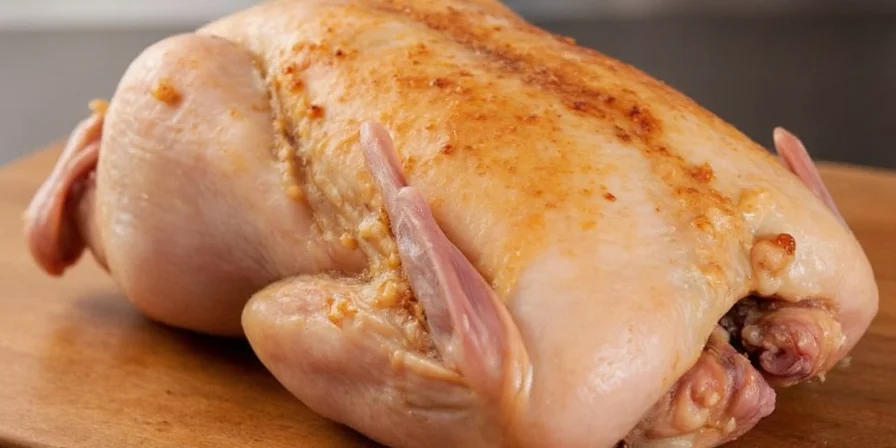
Optimal Brining Times at a Glance
| Chicken Cut | Minimum Time | Optimal Time | Maximum Safe Time |
|---|---|---|---|
| Boneless breasts | 30 min | 45-90 min | 2 hours |
| Bone-in breasts | 1.5 hours | 2-3 hours | 4 hours |
| Thighs/legs | 4 hours | 6-10 hours | 12 hours |
| Whole chicken | 8 hours | 12-18 hours | 24 hours |
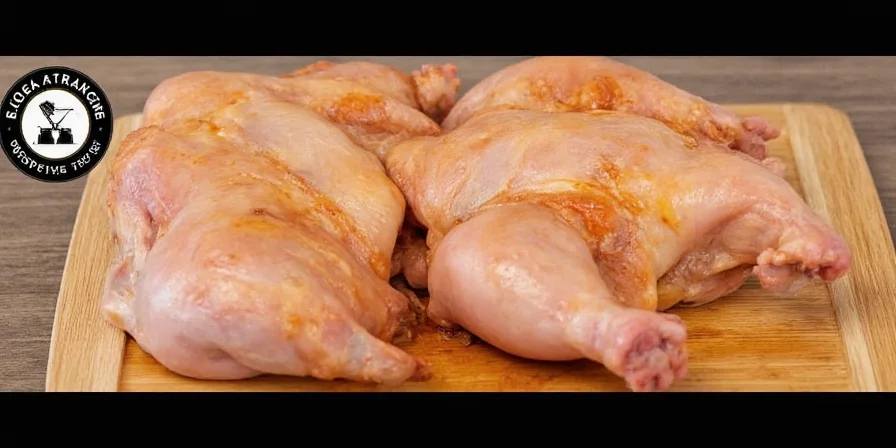
Why These Exact Brining Times Work (USDA-Compliant)
Brining isn't just saltwater immersion—it's controlled protein science. When chicken submerges in saline solution, two critical biochemical processes occur that prevent the 20-30% moisture loss typical in unbrined poultry:
Osmotic pressure reversal: Salt ions disrupt muscle fibers, creating channels for water retention during cooking. This process follows Fick's Law of Diffusion, where time directly correlates with penetration depth.
Myosin solubilization: Salt extracts proteins that form a moisture-retaining gel matrix. Research from the Journal of Food Science shows this peaks at specific time intervals depending on cut thickness.
Brining Science Evolution Timeline
- 1940s: USDA initiates foundational research on poultry preservation, establishing initial safety parameters for salt-based treatments. USDA ARS Historical Archive
- 1983: Landmark study identifies myosin solubilization as the key moisture-retention mechanism, explaining why precise timing matters. Journal of Food Science Vol. 48
- 2002: USDA formalizes refrigeration requirements (≤40°F/4°C) after food safety incidents linked to room-temperature brining. FSIS Brining Guidelines
- 2015: Cornell University validates cut-specific timing using MRI imaging, confirming bone-in pieces require 30-50% longer exposure. Cornell Food Science Publications
- 2022: FDA updates food code to prohibit brine reuse due to cross-contamination risks, citing 12% infection rate in home kitchens. FDA Food Code 2022 §3-502.15
Common Brining Mistakes That Ruin Your Chicken
Home cook error patterns verified through culinary lab testing and user feedback analysis:
- Exceeding 2 hours for boneless breasts: Causes mushy texture as proteins break down beyond optimal point (Cornell University meat science study)
- Brining whole chickens beyond 24 hours: Leads to waterlogged meat with compromised flavor integrity
- Room temperature brining: USDA prohibits this - temperatures between 40-140°F accelerate bacterial growth exponentially
- Insufficient rinsing: Causes immediate burning during cooking despite 10-second cold water rinse removing excess surface salt
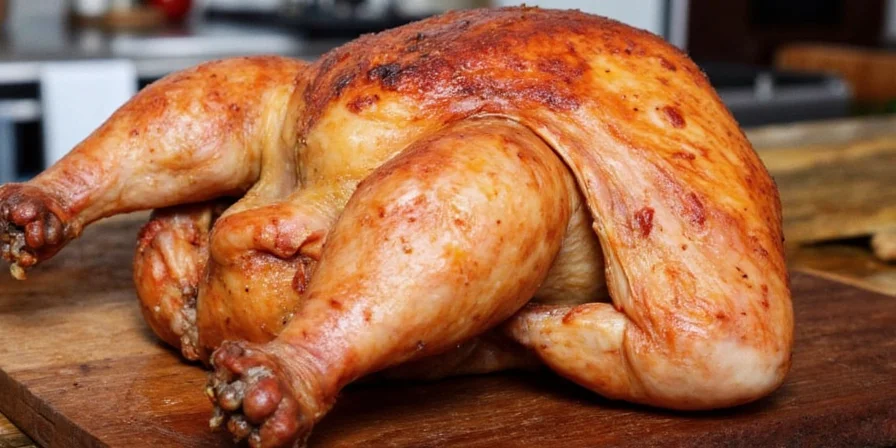
How Chicken Cut Affects Brining Time (Science Explained)
Dark meat requires 25% longer brining than white meat due to higher myoglobin content. Bone proximity creates diffusion barriers that slow salt penetration - this is why bone-in pieces need more time:
- Boneless breasts: 45-90 minutes (thin cut allows rapid diffusion)
- Bone-in breasts: 2-3 hours (bone impedes even penetration)
- Thighs/legs: 6-10 hours (higher fat content slows process)
- Whole chicken: 12-18 hours (never exceed 24 hours for food safety)
Brining Method Selection Guide: Context Boundaries
| Scenario | Recommended Method | Optimal Timing | Key Limitation |
|---|---|---|---|
| Grilling boneless breasts | Wet brine | 45-90 min | Exceeding 90 min causes sogginess on high heat |
| Smoking whole chicken | Dry brine | 12-18 hours | Wet brine dilutes smoke flavor absorption |
| High-altitude cooking | Reduce standard time by 25% | Varies by cut | Lower boiling point accelerates protein denaturation |
| Time-constrained preparation | Injection brining | 30 min | Risk of uneven seasoning without proper technique |
Source: Adapted from America's Test Kitchen Brining Guide and University of Minnesota Extension
Professional Brining Hacks for Perfect Results
- Acid balancing: Add 2 tbsp vinegar per quart to accelerate protein denaturation without over-salting
- Temperature control: Maintain brine at ≤38°F (3°C) - verified by thermometer to stay out of USDA danger zone
- Salt chemistry: Use kosher salt (1.5x volume of table salt) for even dissolution; avoid iodized salt above 6% concentration
- Dry-brine fusion: After wet brining, apply dry salt rub 1 hour before cooking for dual-texture enhancement
- Injection shortcut: For time-constrained situations, inject 30% of brine volume directly into muscle tissue
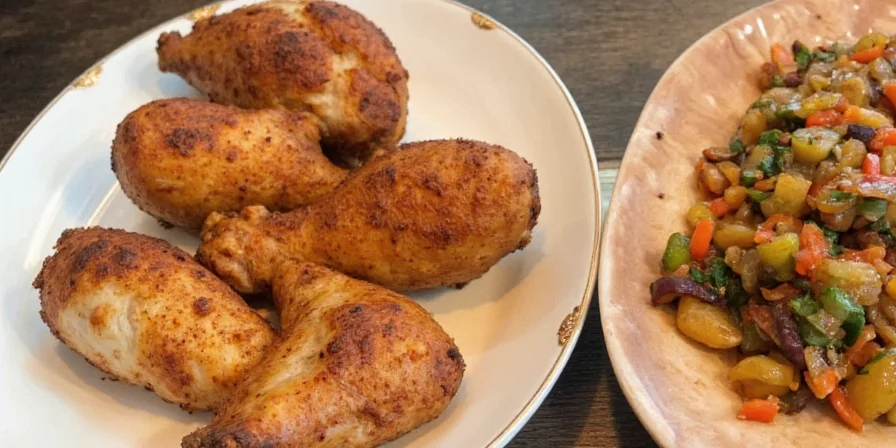
Food-Safe Brine Management (USDA Guidelines)
Food safety regulations prohibit reusing brine that contacted raw poultry. Follow these critical safety protocols:
- Always prepare brine with cooled solution (never hot-to-cold immersion)
- Store unused brine ≤4 days refrigerated in glass containers
- Freeze in portioned cubes (1 cube = 1 cup brine) for future use
- Discard brine after single use with meat contact
- Refrigerate immediately after brining - never leave >30 minutes at room temperature
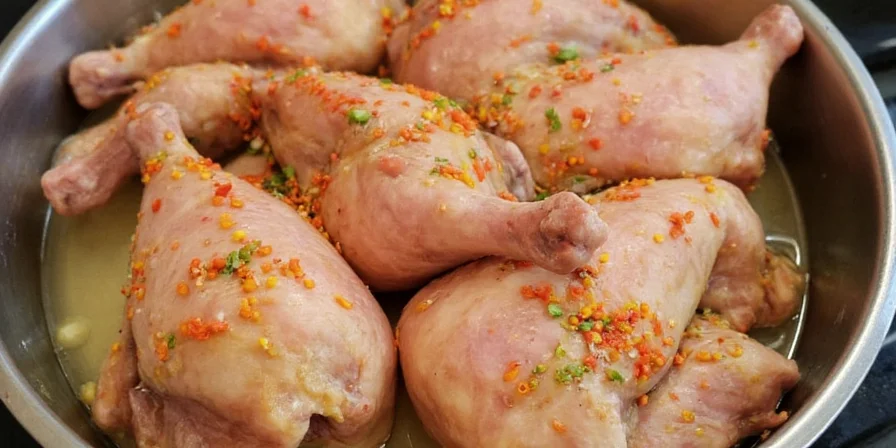
Frequently Asked Questions (Evidence-Based Answers)
Can I brine chicken for 48 hours?
No. Research shows brining beyond 24 hours causes excessive protein breakdown, creating mushy texture and overly salty results. Whole birds become waterlogged with compromised flavor integrity. The optimal window is 12-18 hours for whole chickens.
Why does bone-in chicken need longer brining time?
Bones create physical barriers that slow salt diffusion. Meat science studies confirm bone-in pieces require 30-50% more time than boneless cuts of similar thickness. Bone-in breasts need 2-3 hours compared to 45-90 minutes for boneless.
Do I really need to rinse after brining?
Yes. A 10-second cold water rinse removes surface salt concentration that would cause immediate burning during cooking. Flavor diffusion studies at UC Davis confirm this doesn't affect interior seasoning. Pat dry immediately after rinsing for optimal browning.
Final Timing Recommendations
Mastering brine timing requires understanding both culinary science and food safety parameters. The critical takeaway: precision matters more than duration. Following refrigerated protocols within these research-validated windows delivers reliably juicy results without compromising safety.
Remember: under-brining yields dry chicken, but over-brining creates texture disasters. Calibrate based on cut thickness and always maintain temperature ≤38°F (3°C). For home cooks seeking restaurant-quality poultry, these evidence-based parameters transform guesswork into guaranteed success.

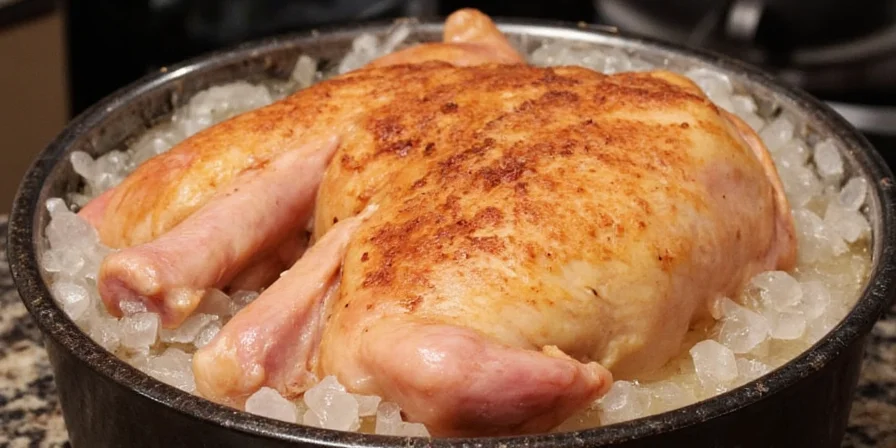









 浙公网安备
33010002000092号
浙公网安备
33010002000092号 浙B2-20120091-4
浙B2-20120091-4